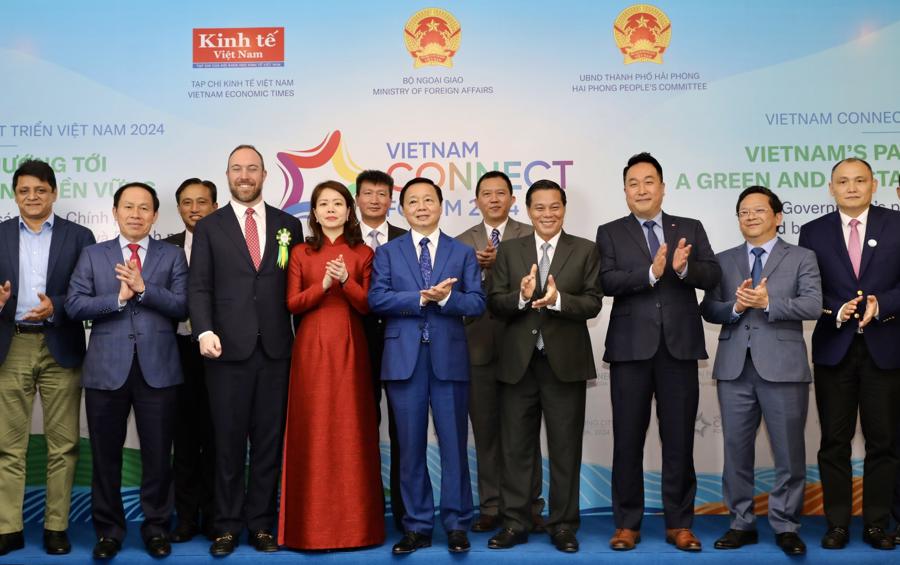As the bustling seaport of Hai Phong played host to the 4th Vietnam Connect Forum on April 10, a palpable sense of momentum and determination permeated the atmosphere.
In his address to an international audience of 300 businesses, government officials, and organizations, Deputy Prime Minister Tran Hong Ha galvanized the gathering with his words, articulating Vietnam’s unwavering resolve to forge a new path towards a sustainable future.

A Global Imperative, A Vietnamese Commitment
In his keynote speech, Deputy Prime Minister Ha emphasized the global significance and urgency of adopting a green economy agenda.
“The world’s paramount challenge is how we choose to grow,” he declared. “It is time to recognize that the prevailing paradigm has shifted.”
He argued that nations can no longer rely solely on the exploitation of natural resources, as existing economic models have exacerbated inequality, environmental degradation, and the looming threat of climate change.
However, he asserted that Vietnam has made its choice. “For the first time, our commitment to a clean and circular economy model has been enshrined in the resolution of the Party Congress, reflecting the will of the Vietnamese people nationwide.”
This unequivocal commitment, he explained, has been further reinforced by a series of national strategies and policies aimed at driving the transition to a green economy.
Overcoming Technological and Financial Hurdles
While acknowledging that the path to a green economy is fraught with challenges, Mr. Ha highlighted the technological and financial barriers that pose significant obstacles.
“After working with G7 nations, none have conveyed to me that they are fully prepared for green technology,” he said, emphasizing the urgent need for Vietnam to secure access to critical innovations that will drive the renewable energy revolution.
The financial conundrum is equally daunting.
“How can global financial institutions align their strategies with the partnership between governments and businesses towards green and sustainable growth?” Mr. Ha questioned, calling for the development of new mechanisms to mobilize the necessary resources to fund the green transition.
A Collaborative Approach: Government, Businesses, and the Global Community
The Deputy Prime Minister emphasized that no single entity can address global challenges alone, stressing the need for a collaborative approach that unites governments, businesses, and the international community.
“No country can tackle this challenge independently. Only by working together can we hope to achieve our goal of limiting the Earth’s temperature rise to 1.5 degrees Celsius and preventing a catastrophic three-meter sea level rise,” he declared, underscoring the absolute necessity of collective action. “A three-meter rise in sea level would spell the end of civilization as we know it.”
Within this framework, Mr. Ha outlined Vietnam’s efforts to establish strategic partnerships, both regionally and globally.
He highlighted the country’s engagement with ASEAN-Japan cooperation on carbon neutrality and its pioneering initiatives in offshore wind power with Singapore, demonstrating Vietnam’s commitment to seeking innovative pathways to drive progress.
Prioritizing the Green Transition in Key Sectors
Deputy Prime Minister Ha also identified specific sectors where Vietnam is well-positioned to lead the green revolution, with agriculture being a prime example.
“Vietnam’s agriculture holds immense potential to become a beacon of sustainable development,” he said, emphasizing its ability to reduce greenhouse gas emissions while unlocking opportunities for carbon trading.
The energy sector is another focal point, with Vietnam aiming to become a renewable energy hub. Mr. Ha outlined plans to harness offshore wind power and explore the transition to hydrogen-based fuels, underscoring the government’s commitment to diversifying the energy mix and phasing out fossil fuel dependency.
Empowering Businesses and Citizens as Agents of Change
The Deputy Prime Minister acknowledged the critical role that businesses and citizens must play in driving Vietnam’s green transformation, echoing the remarks of Hai Phong’s Party Chief Le Tien Chau, who had earlier stated that “businesses must take the lead.”
“The businesses we encourage are those who share our commitment to green and sustainable growth. We prioritize partnering with companies willing to invest in research and development, transferring technology to advance these goals. Without green research, implementation, and development, progress is impossible,” Mr. Ha asserted.
“We must transition away from investments based solely on low-cost labor and land,” he stated. “We will set green and sustainable criteria, which will be the bedrock of our strategy to attract foreign investment.”
Equally important, he noted, is the need to empower local communities and individuals as agents of change. “If we can refine our business practices, it will inspire everyone to follow suit. In embracing this green growth model, I believe that even farmers, every farmer, and every business will become the nucleus of transformation.”
A Roadmap for Sustainable Progress
As the Deputy Prime Minister elaborated on his vision, he called for a collective effort to chart a clear roadmap for Vietnam’s transition to a green economy.
“This conference must extend beyond mere discussion and focus on tangible actions. We are eager to listen to businesses, citizens, and all stakeholders to foster innovation and optimize collaboration between the government, local authorities, businesses, and the public.”












